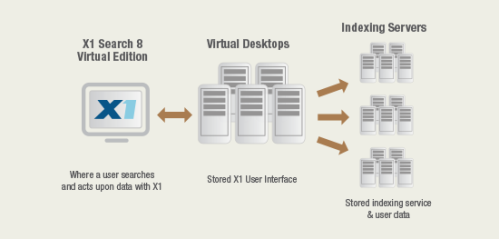In talking with a business acquaintance recently, a question came up about the future of desktop search: what happens when the desktop is no longer the interface of choice for business professionals? It’s a great question, and one I clearly have a vested interest in given X1’s status as the leading desktop search engine. The reality is that today’s workers access their information from a variety of interfaces across many devices. What we need to do is think of the desktop less in a literal sense and more in terms of being a user interface for information.
Since the dawn of the PC, the desktop has been the user interface for most business professionals to access information and do their jobs. The future of that desktop no longer lies in accessing it on a PC, or even a laptop or mobile device. Given the speed of innovation, it is useless to try and forecast what the “desktop” will look like beyond a five-year timeframe. Already, there are stories emerging about the desktop being built into things like tabletop coffee tables. It is absolutely fun and inspiring to see developments like this and to know we are making forward progress in the tech world. At the same time, we need to make sure that information – which will be stored in a variety of locations, too – is accessible to the business professional no matter what the desktop looks like in the future.
That is why X1’s Search 8, Virtual Edition is so exciting. The flagship product, Search 8, represents years of experience providing a beloved user interface to a business profession’s most critical information – email, files, SharePoint, etc. When the product first came out nearly a decade ago, most of that information was stored locally. Thus, a local index could live on the desktop and X1 could provide fast-as-you-type search results and filtering on that local index. Given the evolution of the desktop and the variety of devices accessing that desktop, a local index is not always a possibility. That’s where Search 8, Virtual Edition comes in. The client interface is decoupled from the index, which can live anywhere (typically off on a server farm).
This allows IT teams that have invested in desktop virtualization (VDI) to turn off Windows indexing (necessary to save virtual resources) and still provide business professionals the ability to find their information. Desktop virtualization enables many of the things that businesses value highly – especially security and mobility – and comes in its own variety of flavors. VDI can be either on-premise and through the Cloud, as Desktop-as-a-service (DaaS). Increasingly, DaaS offerings such as Amazon Workspaces are becoming more enterprise ready and promise to deliver desktops in a “whenever, wherever” fashion (and, as I’ve posted about before, a good search experience will be crucial to getting the most out of DaaS).
That Search 8, Virtual Edition helps enable and optimal experience with desktop virtualization and DaaS is a great thing, but the value does not stop there. The same concept – allowing the index to be decoupled from the client interface – will enable great search experiences for mobile, which is the next big stomping ground for enterprise IT. And, X1 is the only search vendor providing this capability. We know that the concept of the desktop could live anywhere. And, our customers want to be able to use X1 Search 8 even if they are unable to have a local index on their machine or device.
The term “desktop search” is already out there and meaningful to many people, so it’s not about changing what we call this market. Rather, it’s about changing the mindset – realizing that the desktop is not just the screen on your PC, but rather the gateway to all of your important information needed to do your job.

